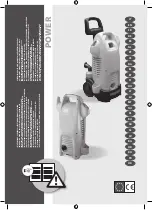
15
TROUBLESHOOTING
If you experience
Possible Causes
Solution
Vibration or Off-Balance
Vibration, rocking, or
“walking”
Feet may not be in contact with the floor
and locked.
Front and rear feet must be in firm contact with floor, and washer must
be level to operate properly.
Washer may not be level.
Check floor for flexing or sagging. If flooring is uneven, a 3/4"
(19 mm) piece of plywood under your washer will reduce sound.
See “Level the Washer” in the Installation Instructions.
Vibration during spinning or
washer stopped
Load could be unbalanced.
Load items in loose heaps evenly around the washplate. Adding wet items
to washer or adding more water to basket could unbalance washer.
Avoid washing single items. Balance a single item such as a rug or jeans
jacket with a few extra items. Redistribute the load, close the lid, and
touch and hold START/PAUSE/Unlock Lid.
Use Bulky/Sheets Deep Water Wash cycle for oversized, non-absorbent
items such as comforters or poly-filled jackets. Other items are not
appropriate for Bulky/Sheets Normal cycle. See “Cycle Guide.”
Item or load not suitable for selected cycle. See “Cycle Guide” and
“Using Your Washer.”
Noises – For normal operating sounds, go to www.kenmore.com.
Clicking or metallic noises
Objects may be caught in washer drain
system.
Empty pockets before washing. Loose items such as coins could fall
between basket and tub or may block pump. It may be necessary to call
for service to remove items.
It is normal to hear metal items on clothing such as metal snaps, buckles,
or zippers touch against the stainless steel basket.
Gurgling or humming
Washer may be draining water.
It is normal to hear the pump making a continuous humming sound with
periodic gurgling or surging as final amounts of water are removed
during the spin/drain cycles.
Humming
Load sensing may be occurring.
You may hear the hum of the sensing spins after you have started the
washer. This is normal.
Whirring
Basket may be slowing down.
You may hear the whirring sound of the basket slowing down.
This is normal.
Water Leaks
Check the following for
proper installation:
Washer not level.
See Installation Instructions for details on how to level your washer.
Fill hoses not attached tightly.
Tighten fill-hose connection.
Fill hose washers.
Make sure all four fill hose flat washers are properly seated.
Drain hose connection.
Pull drain hose from washer cabinet and properly secure it to drainpipe
or laundry tub.
Do not place tape over drain opening.
Check household plumbing for leaks or
clogged sink or drain.
Water can back up out of a clogged sink or drainpipe. Check all
household plumbing for leaks (laundry tubs, drain pipe, water pipes, and
faucets.)
Washer not loaded as
recommended.
An unbalanced load can cause basket to be out of alignment and cause
water to splash off tub. See “Using Your Washer” for loading instructions.
Washer not performing as expected
Not enough water
in washer
Load not completely covered
in water.
This is normal operation for an HE low-water washer. The load will not be
completely underwater. The washer senses load
sizes and adds correct amount of water for optimal cleaning. See
“What’s New under the Lid.”
IMPORTANT:
Do not add more water to washer. Adding water lifts the
items off the washplate, resulting in less effective cleaning.
Run clean washer cycle to optimize the water level and
wash performance.
First try the solutions suggested here for assistance and to possibly avoid a service call.
















































